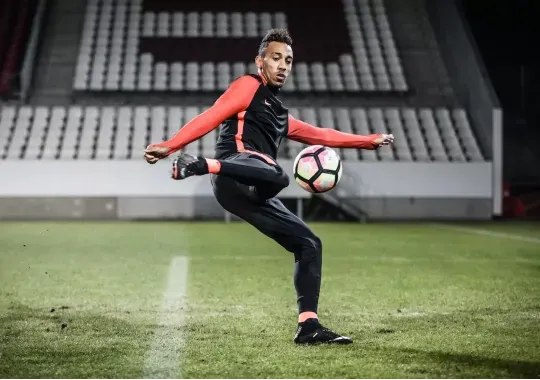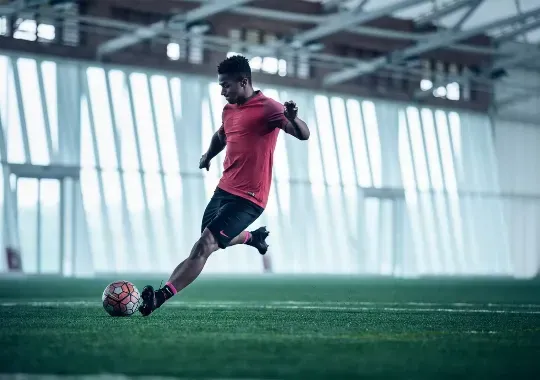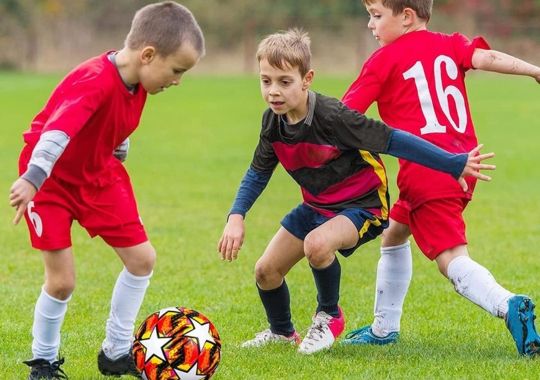Soccer, the world's most popular sport, is played and celebrated across the globe. At the heart of this beautiful game lies the soccer ball, an essential component that symbolizes the spirit and excitement of every match. Have you ever wondered where your favorite Nike soccer balls are made? Join us as we embark on a journey to explore the manufacturing origins of Nike soccer balls.
As Amazon affiliates we may earn a commission if you purchase a product at no cost to you.

Process of making soccer balls. Learn from this informative video.
Nike Soccer Ball Manufacturing Facilities Worldwide
Nike soccer balls are manufactured in various locations across the globe, reflecting the brand's commitment to global production and ensuring quality products for soccer players worldwide. Let's explore some of the key manufacturing locations and the factors that influence production decisions.
Exploring Global Manufacturing Locations
Nike has established manufacturing facilities in different regions to meet the demand for soccer balls and optimize production efficiency. Some of the notable manufacturing locations include:
- China: China has been a significant hub for Nike's soccer ball production. The country offers advanced manufacturing infrastructure, skilled labor, and technological expertise, making it an ideal location for high-volume production.
- Pakistan: Pakistan has a long-standing tradition in soccer ball manufacturing and craftsmanship. The country is known for its skilled artisans who hand-stitch soccer balls with meticulous attention to detail. Nike has partnered with manufacturers in Pakistan to harness this expertise.
- Thailand: Thailand has emerged as a key manufacturing location for Nike soccer balls due to its skilled workforce and manufacturing capabilities. The country's expertise in synthetic material production and ball manufacturing contributes to the production of high-quality soccer balls.
- Vietnam: Nike has also expanded its manufacturing operations to Vietnam. The country offers a favorable manufacturing environment, with its well-developed textile and garment industry supporting the production of soccer balls.
Factors Influencing Production Decisions
Several factors influence Nike's production decisions when selecting manufacturing locations for soccer balls. These factors include:
- Expertise and Skill: Nike considers the expertise and skill available in specific regions. Manufacturing locations with a long history and tradition in soccer ball production, like Pakistan, offer a wealth of craftsmanship and knowledge that can enhance the quality of the final product.
- Manufacturing Infrastructure: The presence of advanced manufacturing infrastructure and capabilities is essential for efficient and cost-effective production. Locations like China, Thailand, and Vietnam offer robust manufacturing facilities that meet Nike's production needs.
- Supply Chain Optimization: Proximity to raw materials and suppliers is a crucial consideration. Selecting manufacturing locations that are close to sources of synthetic materials and other components streamlines the supply chain, reducing lead times and logistical complexities.
- Cost and Efficiency: Cost considerations, including labor costs and production efficiencies, play a role in production decisions. Nike seeks a balance between quality and cost-effectiveness to provide soccer balls that meet the needs of players at various price points.

A Brand Overview
Nike, a global leader in sports apparel and equipment, has a strong presence in the soccer equipment industry. The company's commitment to quality and innovation has made it a popular choice among soccer players and enthusiasts worldwide.
Nike's Presence in the Soccer Equipment Industry
Nike's involvement in soccer goes beyond being a mere equipment provider. The brand has established itself as a trusted and reputable name in the industry, offering a wide range of soccer products, including jerseys, footwear, and, of course, soccer balls.
Nike's presence is felt not only at the grassroots level but also in professional soccer. Many top-tier clubs, national teams, and individual players are sponsored by Nike, showcasing the brand's influence and reach within the soccer community.
Commitment to Quality and Innovation
Nike is renowned for its unwavering commitment to quality and continuous innovation. When it comes to soccer balls, Nike sets high standards to ensure optimal performance and durability.
The brand invests heavily in research and development, leveraging cutting-edge technologies and materials to create soccer balls that meet the demands of players at every level. Nike's extensive testing procedures ensure that each ball meets or exceeds industry standards, providing players with a reliable and consistent playing experience.
Nike also collaborates with top professional players and incorporates their feedback into the design and development process. This collaboration allows for the creation of soccer balls that are tailored to the specific needs and preferences of players, further enhancing performance and playability.
The Manufacturing Process of Nike Soccer Balls
Nike soccer balls undergo a meticulous manufacturing process that combines design, technology, and quality control measures. Let's take an inside look at how Nike soccer balls are created from initial design concepts to the final product.
From Design to Production
The journey of a Nike soccer ball starts with design concepts that take into account factors such as aerodynamics, ball control, and durability. Nike's design teams work closely with engineers and professional players to develop innovative features that enhance performance on the field.
Quality Control Measures and Standards
Nike maintains strict quality control measures throughout the manufacturing process to uphold its commitment to excellence. Each soccer ball undergoes rigorous testing to ensure it meets or exceeds industry standards.
Quality control tests include assessments of factors like weight, circumference, and roundness to ensure consistency across all balls. Impact and durability tests are conducted to verify the ball's ability to withstand the demands of intense gameplay. These tests simulate various playing conditions, ensuring that Nike soccer balls perform well in different environments.
The quality control measures and standards implemented by Nike guarantee that every soccer ball leaving the manufacturing facility meets the brand's high-quality expectations. This commitment to excellence ensures that players can trust in the performance, durability, and consistency of Nike soccer balls on the field.

The Role of Ethical and Sustainable Practices
Nike recognizes the importance of ethical and sustainable practices in the manufacturing of soccer balls. The brand has implemented various initiatives to promote responsible production and ensure the well-being of workers and the environment.
Nike's Approach to Ethical Manufacturing
Ethical manufacturing is a core focus for Nike, and the brand is committed to upholding fair labor practices across its supply chain. Nike partners with manufacturers who adhere to strict labor standards, ensuring safe working conditions, fair wages, and reasonable working hours for employees involved in soccer ball production.
To ensure compliance with these standards, Nike has established a robust monitoring and auditing process. Regular audits and assessments are conducted to evaluate the working conditions and labor practices at manufacturing facilities. This helps to identify any areas of improvement and ensures that the ethical standards set by Nike are upheld.
Sustainability Initiatives in Soccer Ball Production
Nike is dedicated to minimizing its environmental impact and promoting sustainability in soccer ball production. The brand has implemented several initiatives to reduce waste, conserve resources, and develop sustainable materials.
One key initiative is Nike's commitment to using recycled materials in their soccer balls. By incorporating recycled polyester and other recycled materials, Nike reduces the reliance on virgin resources and helps to divert waste from landfills. This contributes to a more circular economy and a reduced carbon footprint.
Moreover, Nike is actively exploring alternative materials and manufacturing processes that have a lower environmental impact. This includes researching and developing innovative technologies that can reduce water consumption, energy usage, and greenhouse gas emissions in the production of soccer balls.
Through these sustainability initiatives, Nike aims to not only create high-quality soccer balls but also ensure that their manufacturing processes align with responsible environmental practices.
Nike's approach to ethical manufacturing and sustainability demonstrates the brand's commitment to producing soccer balls that not only meet high-performance standards but also uphold ethical labor practices and minimize environmental impact. By supporting Nike soccer balls, consumers can contribute to a more sustainable and responsible soccer industry.
Unveiling Specific Origins
Nike soccer balls are manufactured in various countries around the world, each with its own unique manufacturing insights and expertise. Let's delve into country-specific origins and explore the regional contributions to Nike soccer ball production.
Country-Specific Manufacturing Insights
- China: China has been a prominent manufacturing hub for Nike soccer balls. With its advanced manufacturing infrastructure and skilled labor force, China contributes significantly to the production of high-quality soccer balls. The country's expertise in mass production and technological advancements enables efficient manufacturing processes and ensures the availability of Nike soccer balls to a wide global market.
- Pakistan: Pakistan has a rich history in soccer ball manufacturing, renowned for its craftsmanship and hand-stitching techniques. Skilled artisans in Pakistan meticulously stitch the panels of Nike soccer balls, combining traditional methods with modern manufacturing practices. This expertise contributes to the production of high-quality, durable soccer balls that meet Nike's stringent standards.
- Thailand: Thailand has emerged as a key player in Nike soccer ball production. The country's manufacturing capabilities and expertise in synthetic material production contribute to the creation of soccer balls with excellent durability and performance. Thailand's specialization in synthetic materials enables the production of high-quality outer covers that offer superior ball control and water resistance.
- Vietnam: Nike has expanded its manufacturing operations to Vietnam, capitalizing on the country's well-developed textile and garment industry. Vietnam's skilled workforce and manufacturing capabilities support the production of Nike soccer balls with a focus on efficiency, quality, and timely delivery.
Regional Expertise and Specializations
Each country brings its own expertise and specializations to the manufacturing process of Nike soccer balls. China's strength lies in its large-scale production capabilities, while Pakistan's traditional hand-stitching techniques contribute to the craftsmanship and attention to detail. Thailand's expertise in synthetic material production ensures high-performance outer covers, and Vietnam's efficient manufacturing processes help meet the global demand for Nike soccer balls.
Conclusion
Understanding the manufacturing origins of Nike soccer balls is crucial for soccer players and enthusiasts. The significance of transparency and consumer awareness cannot be overstated. By knowing where Nike soccer balls are made, consumers can assess the quality, ethical practices, and sustainability efforts associated with the production process.
Recommended Article

Frequently Asked Questions FAQs
Where are Nike soccer balls manufactured?
Nike soccer balls are manufactured in various countries around the world, including China, Pakistan, Thailand, and Vietnam. These countries offer different expertise and resources to ensure the production of high-quality soccer balls.
What factors influence Nike's choice of manufacturing locations?
Nike considers several factors when selecting manufacturing locations, including expertise and skill available in specific regions, manufacturing infrastructure, supply chain optimization, and cost and efficiency considerations. These factors help ensure efficient production processes and meet global demand.
How does Nike ensure ethical manufacturing practices in soccer ball production?
Nike is committed to ethical manufacturing practices and upholding fair labor standards. The brand partners with manufacturers who adhere to strict labor standards, conducts regular audits and assessments to monitor working conditions, and collaborates with industry stakeholders to drive continuous improvement in labor practices.











